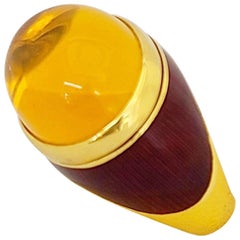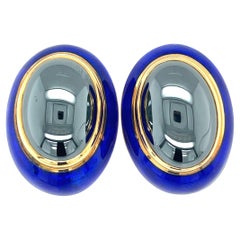William Lowe
1990s American Contemporary Dome Rings
Citrine, Yellow Gold, Enamel
Recent Sales
1990s Contemporary Clip-on Earrings
Hematite, Yellow Gold, Enamel
People Also Browsed
1990s American Fashion Rings
Citrine, 18k Gold
Mid-20th Century American Retro Cocktail Rings
Gold, 14k Gold, Yellow Gold
20th Century Italian Modern Dome Rings
Citrine, 18k Gold, Yellow Gold
A Close Look at Contemporary Jewelry
Contemporary jewelry is inextricably linked with the moment in which it is created, frequently reflecting current social, cultural and political issues such as environmental consciousness, identity and sustainability. It’s informed by fashion trends, from the chokers of the 1990s to the large chain necklaces of the early 2000s.
Jewelry is one of the oldest forms of adornment. Lockets made of silver or gold have been treasured gifts for hundreds of years, for example, and charm bracelets, which have existed since prehistoric times, didn’t become especially popular until the 19th-century reign of Queen Victoria. For many centuries, fine jewelry was used primarily to express wealth or status through lavish materials. Then, in the 1960s, a concept known as the “critique of preciousness” emerged, with jewelers creating pieces that did not get their value from gemstones or precious metals. Instead, it was the jeweler’s artistic vision that was prized and elevated.
This shift still informs Contemporary jewelry being made by artists today. Whether they are using cheap, found materials and working with provocative geometric shapes or seeking out the rarest stones, they are imbuing their work with meaning through their skills, techniques and ideas. Innovative designers such as Elsa Peretti, who popularized sculptural sterling-silver jewelry for Tiffany & Co., and David Yurman, who twisted metal into the simple yet striking Cable bracelet, have also influenced the direction of Contemporary jewelry’s forms and aesthetics.
Meanwhile, technological advancements like metal alloys and laser engraving have led to new possibilities in jewelry design. Now, edgy makers and brands as well as minimalist designers are pushing Contemporary jewelry forward into the 21st century.
Find a collection of Contemporary rings, earrings, necklaces and other jewelry on 1stDibs.
Why Enamel Shines in Jewelry Craftsmanship
From vibrant to subtle, elegant to cheeky, vintage and antique enamel jewelry and watches encompass a wide range of colors and styles, and there are almost as many techniques for creating these distinctive pieces.
Enameling is one of the oldest forms of surface decoration, used to add color to jewelry without having to rely on gemstones. Evidence of enameling goes back to ancient Greece. Throughout history, far-flung cultures favored different techniques. For example, cloisonné enamel was popular during the Byzantine Empire, while artisans living in France and Germany in the Middle Ages preferred champlevé. And Art Nouveau jewelry designers favored plique à jour.
At its core, enamel is the fusion of powdered glass to metal, and artists like enameling because it allows them to add a painterly or illustrative quality to their work.
Cloisonné (“cell” in French) is a technique in the creation of enamel jewelry that sees the use of thin wires of fine silver or gold to outline a design, which is then filled with enamel. The piece is subsequently placed in a kiln where the enamel is melted. Cloisonné is distinct because the individual wires remain visible, forming an outline of the motif.
Champlevé (“level field” in French) enamel is almost the opposite of cloisonné. In this technique, depressions in the metal are made by etching, engraving or chiseling, and then layers of enamel are built up until they rise slightly above the surface of the metal. The enamel is then fired and polished.
Guilloché is a technique in which translucent enamel is applied to a piece of metal that has had designs cut into it using a lathe. After the firing, the patterns on the metal become visible. Guilloché was made famous by Peter Carl Fabergé, whose jewelry house used the technique on many of its objets d’art as well as jewelry.
Find antique and vintage enamel rings, bracelets, necklaces and other accessories on 1stDibs.
Read More
11 of Annie Leibovitz’s Most Talked-About Photographs
See why the famed photographer's celebrity portraits have graced magazine covers and become headline grabbers in their own right for five decades and counting.
Tom Price Sculpted One of These Benches from Resin, the Other from Coal
Part art, part seating, they offer a fascinating meditation on life’s dualities.
The Stories behind the Most Famous Luxury Fashion Logos
From Chanel to YSL, the logos of some legacy fashion houses spark instant brand recognition and have come to symbolize a kind of luxury that feels at once aspirational and attainable.
Brooklyn’s Ground Floor Gallery Spotlights a Diverse Range of Emerging Artists
Cofounders Krista Scenna and Jill Benson highlight the work of underexposed talents and connect them with new collectors.
The Layered Story behind the Iconic Jewels of London’s Stephen Webster
On the 25th anniversary of his innovative Crystal Haze collection, the designer revisits its origins.
The Story behind James Banks’s Jewels Is As Dreamy As the Designs
Brought together by a love of jewelry with meaning, Adam Shulman and Heidi Nahser Fink built a brand that celebrates ingenious design and fine craftsmanship.
Photographer to Know: David Bailey
British portraitist David Bailey gets up close to his celebrity subjects.
High-Society Hijinks Fill the Imagination of Illustrator Tug Rice
The Pennsylvania-born, New York–based artist's whimsical creations affectionately satirize the foibles of his fellow Upper East Siders.

